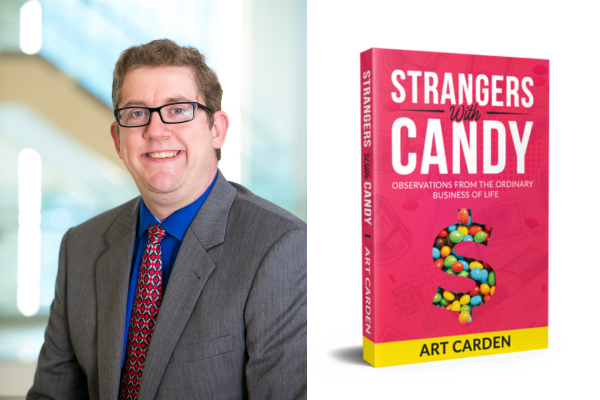Published on June 14, 2023 by Morgan Black

Samford University Professor of Economics Art Carden has had a new book published. Strangers with Candy: Observations from the Ordinary Business of Life is a collection of articles by Carden that explain economics as a study of people’s choices and their unintended consequences.
Strangers with Candy is now available on Amazon in paperback and Kindle versions.
What was your inspiration for this book?
I’ve seen many people compile articles they’ve written into books and decided to do the same with articles I’ve written for the American Institute of Economic Research (AIER) and other outlets. I also believe in the mission of the Libertarian Christian Institute and am honored to have them as a publisher.
What types of articles are included in the collection?
A lot of the book consists of observations and brief analyses of interesting things I’ve noticed. The economist Ronald Coase exhorted economists to “look out the window” and the economist Alfred Marshall described economics as the study of human beings “in the ordinary business of life.” The title comes from one of the essays: we learn when we’re young not to take candy from strangers, but we can buy candy from strangers all the time thanks to the kinds of reputation mechanisms markets produce. I marvel at what human cooperation motivated by nothing more than “minding one’s own business” can produce. Most of the good we will do for people in this life is neither articulated nor deliberate: it comes from mundane stuff like paying your bills, saving a few extra dollars, or working a few extra hours.
What are some of the key things you hope readers will take away from the book?
First, I want readers to see just how radically different our world is from the world of our ancestors. The least of these among us enjoy marvels that royals and Rockefellers could never have imagined—and despite what they might think, there are no limits to economic progress. Second, I want readers to appreciate what makes it all possible: free people with free minds cooperating in free markets without having to ask someone else’s permission to try something new (Deirdre McCloskey and I went into detail on that in Leave Me Alone and I’ll Make You Rich). Third, I want readers to see how much beautiful sense the world starts to make when you see it all through the lenses that the principles of economics provide. You might think you’re just buying dog food, but you’re cooperating with innumerable strangers taking part in a process no single mind can describe from start to finish—and it’s likely your pet eats better than your ancestors did.
This is Carden’s first solo authored book. His first book coauthored with renowned economist Deirdre McClosky, Leave Me Alone and I’ll Make You Rich: How the Bourgeois Deal Enriched the World, held several top spots in Amazon’s new releases in categories such as free enterprise and capitalism books, economic history, business and finance, economics and political ideologies.
Located in the Homewood suburb of Birmingham, Alabama, Samford is a leading Christian university offering undergraduate programs grounded in the liberal arts with an array of nationally recognized graduate and professional schools. Founded in 1841, Samford enrolls 6,324 students from 44 states, Puerto Rico and 16 countries in its 10 academic schools: arts, arts and sciences, business, divinity, education, health professions, law, nursing, pharmacy and public health. Samford is widely recognized as having one of the most beautiful campuses in America, featuring rolling hills, meticulously maintained grounds and Georgian-Colonial architecture. Samford fields 17 athletic teams that compete in the tradition-rich Southern Conference and boasts one of the highest scores in the nation for its 97% Graduation Success Rate among all NCAA Division I schools.

